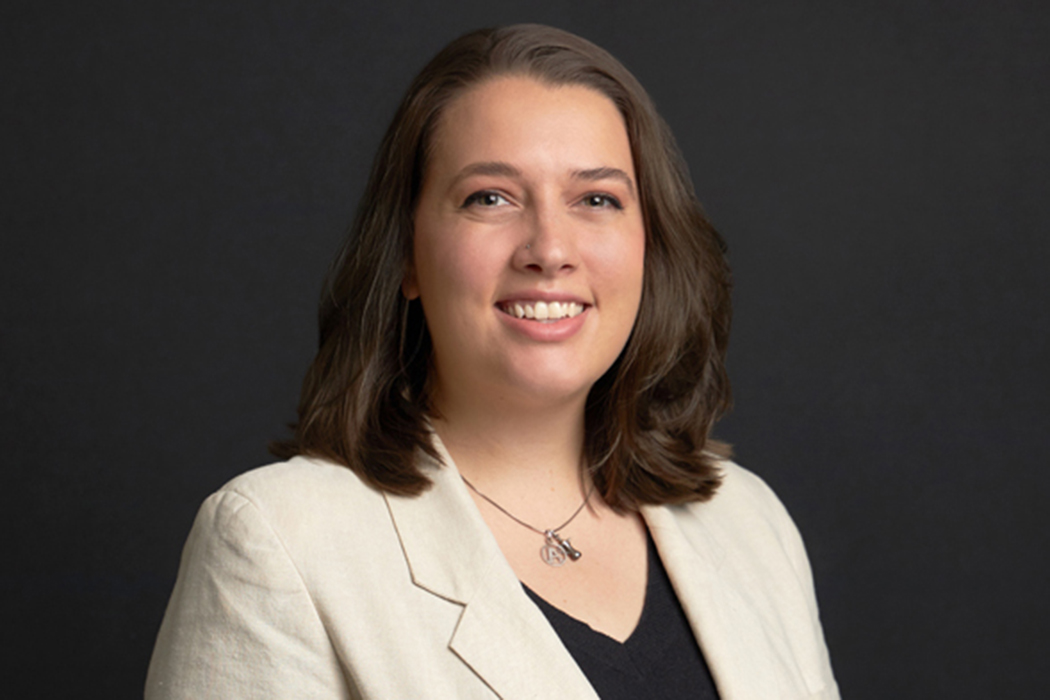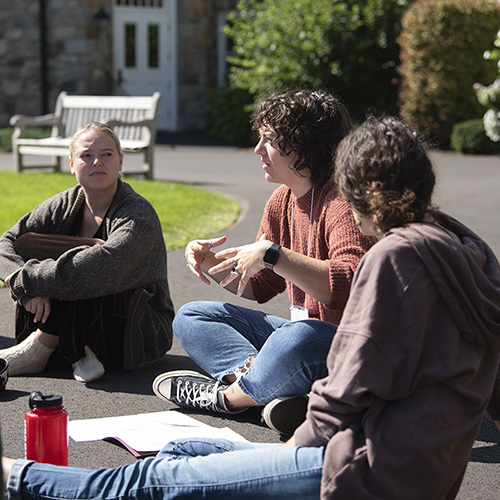
Annarose Jowenson. Courtesy photo.
For spring break, Annarose Jowenson, the campus minister for social justice at Seattle University, takes a group of students to Tijuana, Mexico. They stay there for a week, helping a local nonprofit build homes for people in the community. At the end of each day, after their work is done, they sit in a circle to reflect on their experiences. And then, when the trip is over, they reconvene for a series of debrief sessions.
Jowenson asks questions—What did this experience mean for you? How might it inform changes you want to make in your own lives?—and the students seek to make meaning out of their work.
“Reflecting on your experiences,” says Jowenson, “allows you to take full advantage of the ways that they can inform your identity and your purpose.”
Jowenson honed her understanding of the value of self-reflection as a graduate student in the M.S.W/M.A. dual degree program at Boston College, where she studied social work and theology and ministry from 2019 to 2022.
Self-reflection is a pillar of the University’s long-held commitment to formative education—a guided process that helps students find purpose, live fulfilling lives, and understand the world around them.
And it’s the key component of the latest theme for the BC School of Social Work’s Equity, Justice, and Inclusion Initiative, which is calling on students to harness the power of contemplation to make sense of their experiences.
As a student, Jowenson regularly reflected on the interplay between her practical learning in the field and her theoretical learning in the classroom. She recalled her internship for the City of Newton, Massachusetts’ Department of Youth Services, where she developed lesson plans for high school students in an alternative education program. Not only did this experience inform the focus of her assignments, she said, but it also enabled her to facilitate classroom discussions with her peers.
“I was writing papers based off of programming that I was facilitating in my field placement,” she recalls, “and bringing my lived experience from my field placement into the classroom to say, ‘This is what I’m witnessing and this is how this is playing out.’”
As part of BCSSW’s experiential learning program, Jowenson was required to create written accounts of her interactions at Newton’s Department of Youth Services. Through these written recordings, she examined her own emotions and reactions to the conditions she was working to address, giving her opportunities to explore personal issues that might have influenced her decision making.
“At the end of the day, I found myself really grateful to sit down and put into words what was happening,” says Jowenson. “When I looked back through those reflections, I saw my personal growth as a social worker and an increased awareness of myself, of different situations, and of best practices.”
Oftentimes, Jowenson’s self-reflections extended beyond formalized assignments and classroom discussions. She says she routinely had informal chats with faculty and staff, including her field advisor Ximena Soto, about the direction she wanted to take her career.
“What do you enjoy doing?” Jowenson remembers Soto asking her. “What are your best skills? Do you think you’d rather study in the clinical or macro program?”
“ It was really interesting for me to be able to incorporate both my theological studies into my social work and my social work into my ministerial studies. I already knew that faith informs justice, and justice informs faith, but this program was right up my alley because the work that I was doing was very much praxis. ”
After spending four years as a youth minister at Saint Louise Parish in Bellevue, Washington, Jowenson knew that she wanted to continue working in ministry. But she also realized that she needed to expand her skillset if she wanted to help young people navigate difficult situations to the best of her ability. It didn’t take her long to identify the M.S.W./M.A. dual degree program, offered through the School of Social Work and the School of Theology and Ministry, as the right path to reaching her goal.
On campus, Jowenson found her discussions with faculty especially useful in helping her discover her true vocation—in helping her pinpoint the courses she needed to take and the field experiences she needed to have in order to become expert in serving both the pastoral and social needs of individuals, groups, and communities.
“It was really interesting for me to be able to incorporate both my theological studies into my social work and my social work into my ministerial studies,” says Jowenson, a macro practitioner who belonged to BCSSW’s Latinx Leadership Initiative, a cohort-based program that prepares students to work with Latinx communities to create sustainable solutions to complex problems. “I already knew that faith informs justice, and justice informs faith, but this program was right up my alley because the work that I was doing was very much praxis.”
At Seattle University, Jowenson runs a formation program for students who participate in the spring break trip to Mexico. She meets with the students once a week for the two months leading up the trip, asking them to reflect on what they want to take away from the experience.
She makes them read “To Hell with Good Intentions,” a speech by Ivan Illich, a Roman Catholic Priest who questioned the intent to send well-meaning American college students to volunteer in far-flung corners of the world.
Her goal is twofold: to disabuse students of the notion that they are needed to help people in Tijuana and to push them to reflect on why, exactly, they want to forgo their vacation to build homes instead.
“I try to break down any sort of savior complex that students might have coming in,” says Jowenson. “Life will continue as normal for all of these people, regardless of whether we go or not. So what is it that is really informing their experience? Why are they here? What are they trying to do?”
Jowenson practices what she preaches, incorporating self-reflection into her assessments of her own work. She ponders her purpose, her pedagogy. She wonders how her programs, such as the weeklong spring break trip, will help her students use their gifts in service with and for others.
“What do I want students to get out of this?” she thinks. “And how are they going to leave here making the world a better place?”


